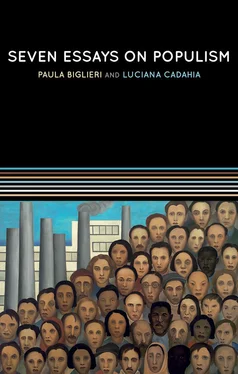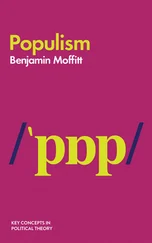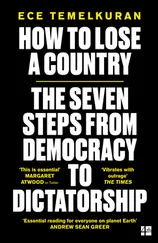Now, the current global scenario that we just described demands that we take up a series of questions not contemplated in classical debates on populist theory. We refer to debates on the opposition between left-wing and right-wing populisms and their relationship with neo-fascism, the emancipatory nature (or lack thereof) of populist projects, their ability to provide a true and lasting alternative to neoliberalism, the link between populism and institutions from the perspective of a popular and emancipatory state, the intersection between populism and plebeian republicanism, the potential for international populist solidarity, and, above all, the need for a fruitful dialogue between populism and popular feminist movements that are confronting patriarchal forms of power, property, and collective sacrifice. Toward this end, we found it much more suggestive to write seven theses on populism – each addressing a specific problem or position – rather than attempting to establish a unified and free-standing corpus. So the reader is not obligated to follow a specific reading order but can instead approach each of the theses independently, according to a web of concrete problems in each case. This is, therefore, an open book, whose subterranean connections between different sections, far from being exhausted by a unitary reading, make room for the uncertainty that each problem poses and the hope that the reader will be able to connect these problems according to their particular interests.
On the other hand, we should note that this book is also the result of a process of collective experience and organization. We could perhaps say that it has been weaving together ever since those initial investigations into populism that we each undertook alongside other researchers, leading to the publication of a groundbreaking book about Kirchnerist populism, 4a study of the relationship between populism and republicanism, 5and its incorporation into contemporary philosophical, political, and historical debates from different contexts. 6But, above all, we must mention that this militant project would not have been possible without the field of study opened up by Ernesto Laclau’s epistemic turn and later contributions by Chantal Mouffe and Jorge Alemán. Nor would it have been possible without the establishment of spaces such as the Ernesto Laclau Open Seminar at the Faculty of Philosophy and Letters of the University of Buenos Aires (UBA), the various projects and open discussion spaces at FLACSO-Ecuador, and the Theorising Transnational Populist Politics project funded by the British Academy. 7
All of these spaces not only allowed the two of us to think together, but also brought together an extraordinary group of colleagues from different continents, both from the politically engaged academic community and from political life. Among them, we would like to thank Sofía Argüello, Javier Balsa, Luis Blengino, Ricardo Camargo Brito, Manuel Canelas, Germán Cano, Volkan Çıdam, Valeria Coronel, Mark Devenney, Allan Dreyer-Hansen, José Enrique Emma López, Íñigio Errejón, José Figueroa, Jorge Foa Torres, Javier Franzé, Zeynep Gambetti, Adoración Guamán, Julio Guanche, Gustavo Guille, Jenny Gunnarsson-Payne, Griselda Gutiérrez, Emma Ingala, María Cecilia Ipar, Andy Knott, Jorge Lago, Anthony Leaker, Juan Pablo Lichtmajer, Oliver Marchart, Sammuele Mazzolini, Emilia Palonen, Gloria Perelló, German Primera Villamizar, Clara Ramas, Franklin Ramírez, Eduardo Rinesi, Anayra Santory, Ian Sinclair, Yannis Stavrakakis, Soledad Stoessel, Ailynn Torres Santana, José Luis Villacañas, and Clare Woodford, among others. These are the kinds of friends that politics and the academy give you when you share concerns, convictions, and the same way of understanding the importance of ethical-political commitment in all knowledge production. Likewise, we cannot fail to mention our infinite debt to Judith Butler, Penelope Deutscher, and their working group for having invited us to form part of the International Consortium of Critical Theory Programs, 8one of the few truly democratizing consortia genuinely concerned with establishing an egalitarian, solidaristic, and fruitful dialogue between knowledge production in the Global South and in the Global North. And within this Consortium, we would particularly like to thank Rosaura Martínez Ruíz, Gisela Catanzaro, Natalia Brizuela, and Leticia Sabsay for having suggested, reviewed, and unconditionally supported the writing of this book. But there are four names that we cannot avoid repeating and to whom we owe particular thanks for generously reading and contributing to this volume: Gloria Perelló, Valeria Coronel, Juan Cárdenas, and Luis Blengino. So, while we wrote this book between March and December of 2019, we can say that the gestation of this work in time and space far exceeds the momentary frenzy in which it was written, and which involved working jointly at a distance, texts shared by email, opinions transferred through WhatsApp messages, discussions carried out through voice memos, and long virtual conversations between Bogotá and Buenos Aires.
Finally, we would like to point out that the title we have chosen for this book is not insignificant, but instead represents a nod to the irreverent creativity and heterodoxy of Latin American critical thinking, a tradition of which we feel we are a part, if only through the humble evocation of José Carlos Mariátegui’s illuminating Seven Interpretive Essays on Peruvian Reality .
Bogotá and Buenos Aires, December 2019
1 1 These soft coups began in 2009 with the removal of Manuel Zelaya in Honduras, followed by coups against Fernando Lugo in Paraguay in 2012, Dilma Rousseff in 2016, and Evo Morales in 2019. And we consider these to be “paradoxically” democratic coups for two reasons. In the first place, because they do not break with the institutional order in the old style of the civilian–military coups of the second half of the twentieth century in Latin America, which explicitly suspended the rule of law and functioned through a permanent state of exception with an alternative juridical order. And, in the second place, because juridical–mediatic complicity creates the fiction of a procedure regulated within the rules of the institutional game.
2 2 For the Latin American right, it has become common practice to persecute judicially popular political leaders once their mandates have ended. This persecution has been called “lawfare” and consists of establishing a link of complicity between some sectors of the judicial branch, corporate–media power, and right-wing presidents. This complicity consists of creating mediatic–judicial cases without any proof or constitutional guarantees whatsoever, through which misleading corruption charges are filed. These cases are managed and tried by judges allied with the mediatic–judicial apparatus, with the goal of damaging the leader’s image nationally and internationally and preventing their return to electoral politics.
3 3 Recall that, in Colombia, during the second term of Juan Manuel Santos, a peace agreement was signed between one of Latin America’s oldest guerrilla organizations (the FARC) and the Colombian government. This peace agreement meant the end of the armed struggle, the disarming of guerrillas, their transition into a political party, and a pact to carry out a series of key reforms for the country. However, after the victory of far-right leader Iván Duque in the most recent elections, the peace process suffered a setback at the hands of the current government, which has translated into the suspension of the process and the return of the logic of war.
4 4 Biglieri and Perelló (2007).
5 5 Coronel and Cadahia (2018).
6 6 Cadahia, Coronel, Valeria, and Ramírez (2018).
7 7 This project was financed by the British Academy, led by Mark Devenney and Paula Biglieri, and carried out by the Centre for Applied Philosophy, Politics, and Ethics at the University of Brighton, and the Ernesto Laclau Open Seminar at the Faculty of Philosophy and Letters of the University of Buenos Aires.
Читать дальше












